Law and Ethics: Examination of Mental Health Act and Case Law
VerifiedAdded on 2021/04/24
|7
|1464
|27
Report
AI Summary
This report examines the intersection of law and ethics within the context of mental health, specifically focusing on the Mental Health Act and its implications. It analyzes three case studies involving individuals detained under the Mental Health Act, exploring the legal and ethical issues surrounding informed consent, patient autonomy, and the right to treatment. The report delves into the complexities of involuntary psychiatric care, the determination of mental capacity, and the balancing act between patient rights and public safety. It highlights the ethical dilemmas faced by healthcare professionals, particularly when patients are unable to make decisions for themselves, and discusses the importance of considering the best interests of the patient while upholding their rights. The report also references relevant legislation, such as the Mental Capacity Act, to provide a comprehensive understanding of the legal framework governing mental health treatment and care.
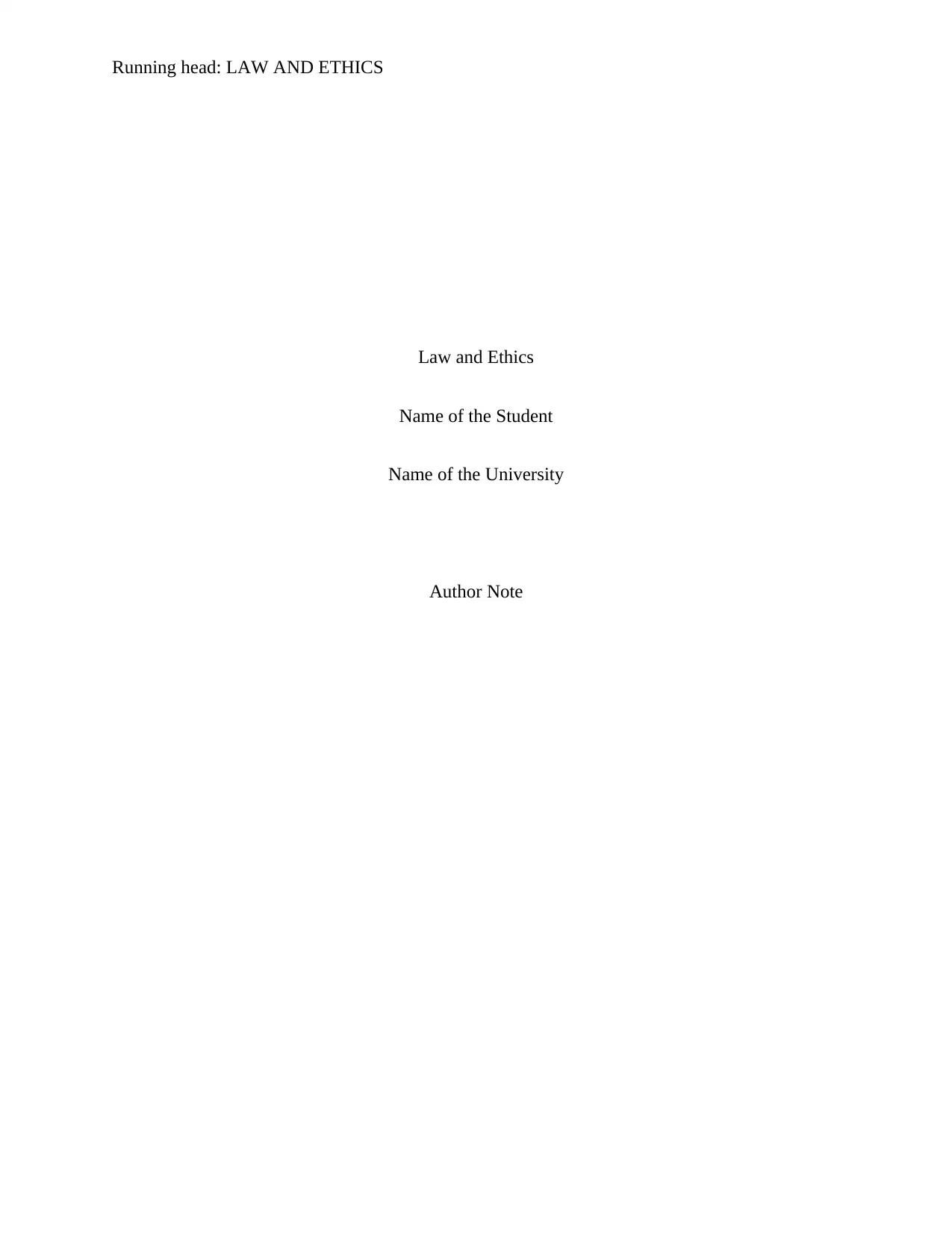
Running head: LAW AND ETHICS
Law and Ethics
Name of the Student
Name of the University
Author Note
Law and Ethics
Name of the Student
Name of the University
Author Note
Paraphrase This Document
Need a fresh take? Get an instant paraphrase of this document with our AI Paraphraser
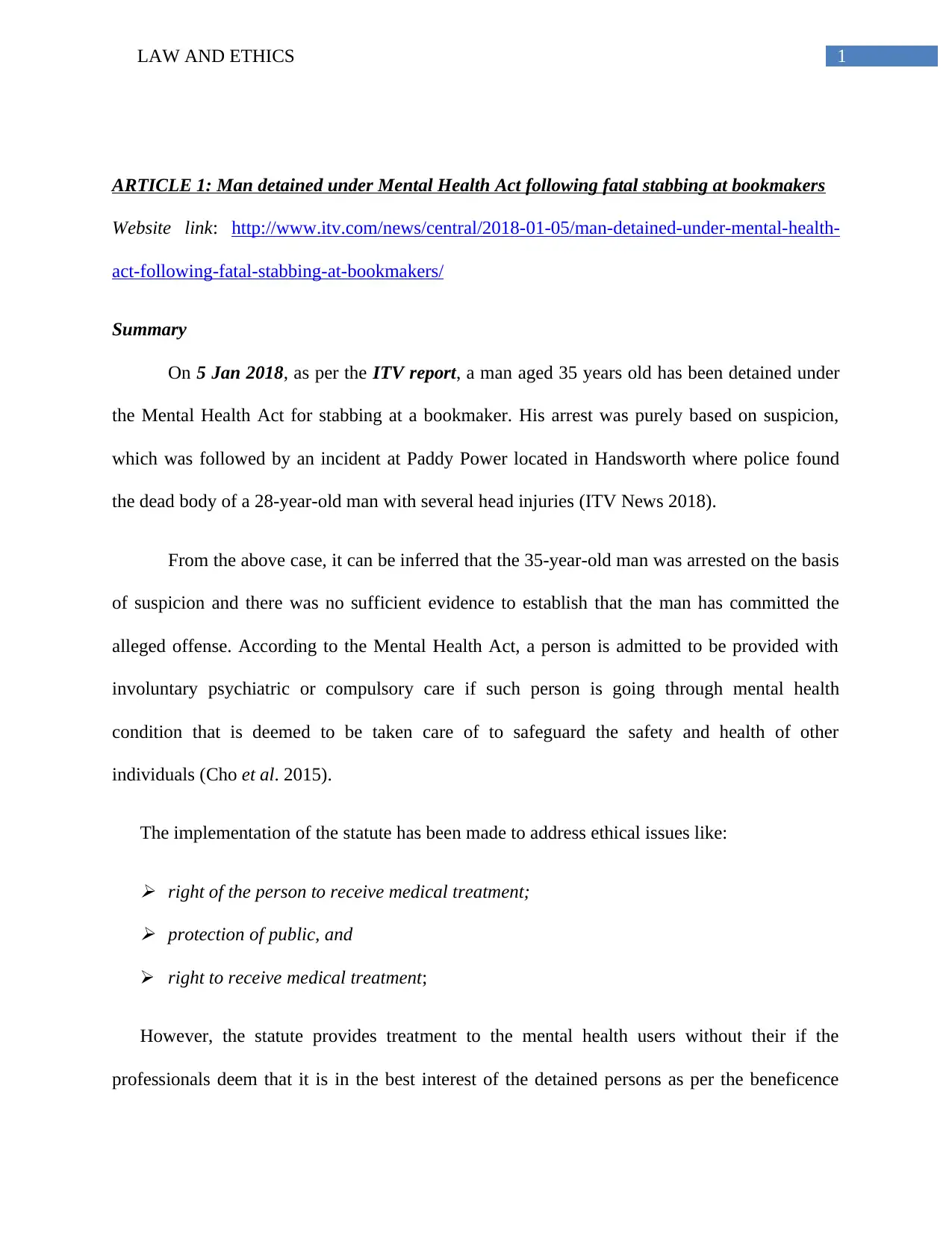
1LAW AND ETHICS
ARTICLE 1: Man detained under Mental Health Act following fatal stabbing at bookmakers
Website link: http://www.itv.com/news/central/2018-01-05/man-detained-under-mental-health-
act-following-fatal-stabbing-at-bookmakers/
Summary
On 5 Jan 2018, as per the ITV report, a man aged 35 years old has been detained under
the Mental Health Act for stabbing at a bookmaker. His arrest was purely based on suspicion,
which was followed by an incident at Paddy Power located in Handsworth where police found
the dead body of a 28-year-old man with several head injuries (ITV News 2018).
From the above case, it can be inferred that the 35-year-old man was arrested on the basis
of suspicion and there was no sufficient evidence to establish that the man has committed the
alleged offense. According to the Mental Health Act, a person is admitted to be provided with
involuntary psychiatric or compulsory care if such person is going through mental health
condition that is deemed to be taken care of to safeguard the safety and health of other
individuals (Cho et al. 2015).
The implementation of the statute has been made to address ethical issues like:
right of the person to receive medical treatment; protection of public, and
right to receive medical treatment;
However, the statute provides treatment to the mental health users without their if the
professionals deem that it is in the best interest of the detained persons as per the beneficence
ARTICLE 1: Man detained under Mental Health Act following fatal stabbing at bookmakers
Website link: http://www.itv.com/news/central/2018-01-05/man-detained-under-mental-health-
act-following-fatal-stabbing-at-bookmakers/
Summary
On 5 Jan 2018, as per the ITV report, a man aged 35 years old has been detained under
the Mental Health Act for stabbing at a bookmaker. His arrest was purely based on suspicion,
which was followed by an incident at Paddy Power located in Handsworth where police found
the dead body of a 28-year-old man with several head injuries (ITV News 2018).
From the above case, it can be inferred that the 35-year-old man was arrested on the basis
of suspicion and there was no sufficient evidence to establish that the man has committed the
alleged offense. According to the Mental Health Act, a person is admitted to be provided with
involuntary psychiatric or compulsory care if such person is going through mental health
condition that is deemed to be taken care of to safeguard the safety and health of other
individuals (Cho et al. 2015).
The implementation of the statute has been made to address ethical issues like:
right of the person to receive medical treatment; protection of public, and
right to receive medical treatment;
However, the statute provides treatment to the mental health users without their if the
professionals deem that it is in the best interest of the detained persons as per the beneficence
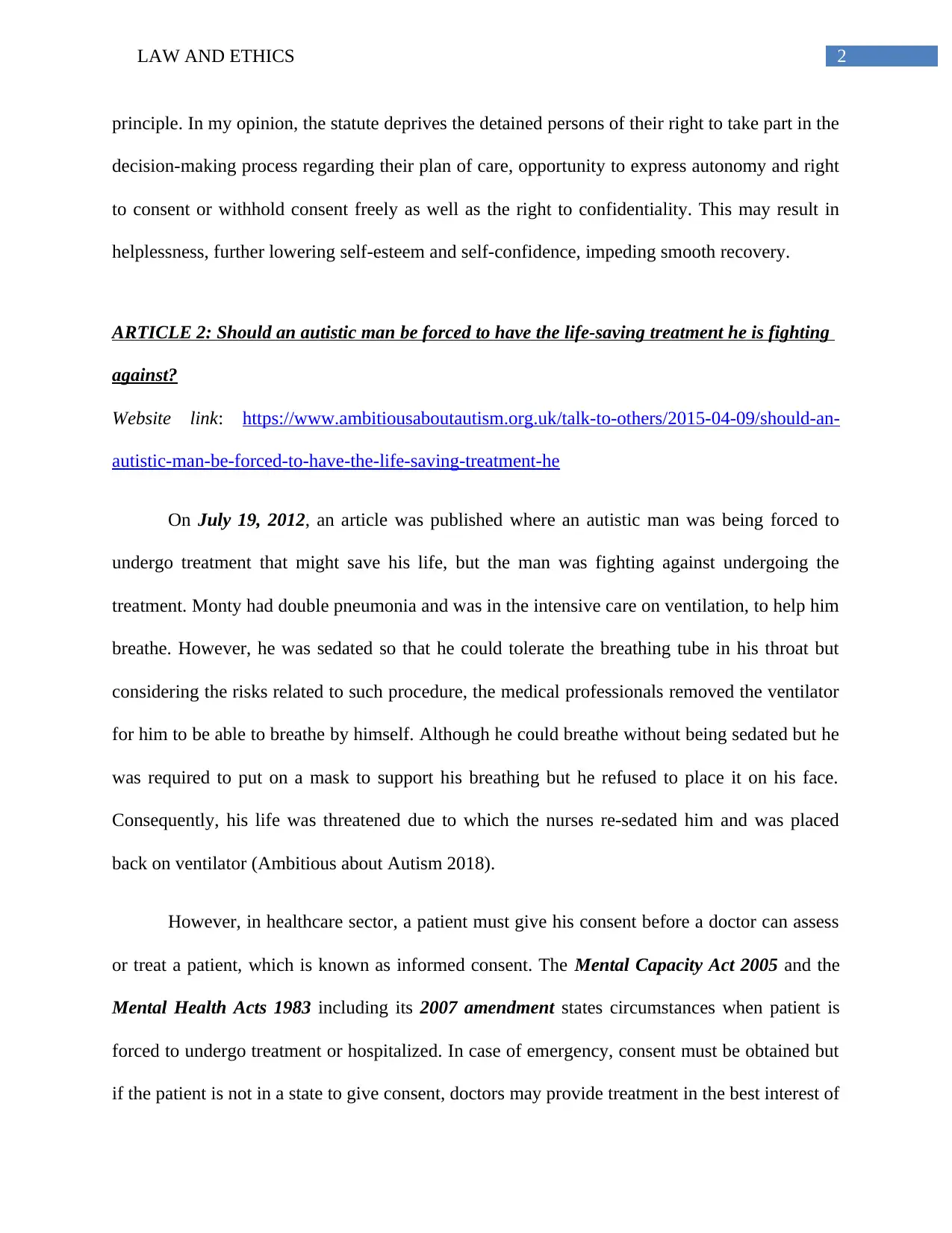
2LAW AND ETHICS
principle. In my opinion, the statute deprives the detained persons of their right to take part in the
decision-making process regarding their plan of care, opportunity to express autonomy and right
to consent or withhold consent freely as well as the right to confidentiality. This may result in
helplessness, further lowering self-esteem and self-confidence, impeding smooth recovery.
ARTICLE 2: Should an autistic man be forced to have the life-saving treatment he is fighting
against?
Website link: https://www.ambitiousaboutautism.org.uk/talk-to-others/2015-04-09/should-an-
autistic-man-be-forced-to-have-the-life-saving-treatment-he
On July 19, 2012, an article was published where an autistic man was being forced to
undergo treatment that might save his life, but the man was fighting against undergoing the
treatment. Monty had double pneumonia and was in the intensive care on ventilation, to help him
breathe. However, he was sedated so that he could tolerate the breathing tube in his throat but
considering the risks related to such procedure, the medical professionals removed the ventilator
for him to be able to breathe by himself. Although he could breathe without being sedated but he
was required to put on a mask to support his breathing but he refused to place it on his face.
Consequently, his life was threatened due to which the nurses re-sedated him and was placed
back on ventilator (Ambitious about Autism 2018).
However, in healthcare sector, a patient must give his consent before a doctor can assess
or treat a patient, which is known as informed consent. The Mental Capacity Act 2005 and the
Mental Health Acts 1983 including its 2007 amendment states circumstances when patient is
forced to undergo treatment or hospitalized. In case of emergency, consent must be obtained but
if the patient is not in a state to give consent, doctors may provide treatment in the best interest of
principle. In my opinion, the statute deprives the detained persons of their right to take part in the
decision-making process regarding their plan of care, opportunity to express autonomy and right
to consent or withhold consent freely as well as the right to confidentiality. This may result in
helplessness, further lowering self-esteem and self-confidence, impeding smooth recovery.
ARTICLE 2: Should an autistic man be forced to have the life-saving treatment he is fighting
against?
Website link: https://www.ambitiousaboutautism.org.uk/talk-to-others/2015-04-09/should-an-
autistic-man-be-forced-to-have-the-life-saving-treatment-he
On July 19, 2012, an article was published where an autistic man was being forced to
undergo treatment that might save his life, but the man was fighting against undergoing the
treatment. Monty had double pneumonia and was in the intensive care on ventilation, to help him
breathe. However, he was sedated so that he could tolerate the breathing tube in his throat but
considering the risks related to such procedure, the medical professionals removed the ventilator
for him to be able to breathe by himself. Although he could breathe without being sedated but he
was required to put on a mask to support his breathing but he refused to place it on his face.
Consequently, his life was threatened due to which the nurses re-sedated him and was placed
back on ventilator (Ambitious about Autism 2018).
However, in healthcare sector, a patient must give his consent before a doctor can assess
or treat a patient, which is known as informed consent. The Mental Capacity Act 2005 and the
Mental Health Acts 1983 including its 2007 amendment states circumstances when patient is
forced to undergo treatment or hospitalized. In case of emergency, consent must be obtained but
if the patient is not in a state to give consent, doctors may provide treatment in the best interest of
⊘ This is a preview!⊘
Do you want full access?
Subscribe today to unlock all pages.

Trusted by 1+ million students worldwide
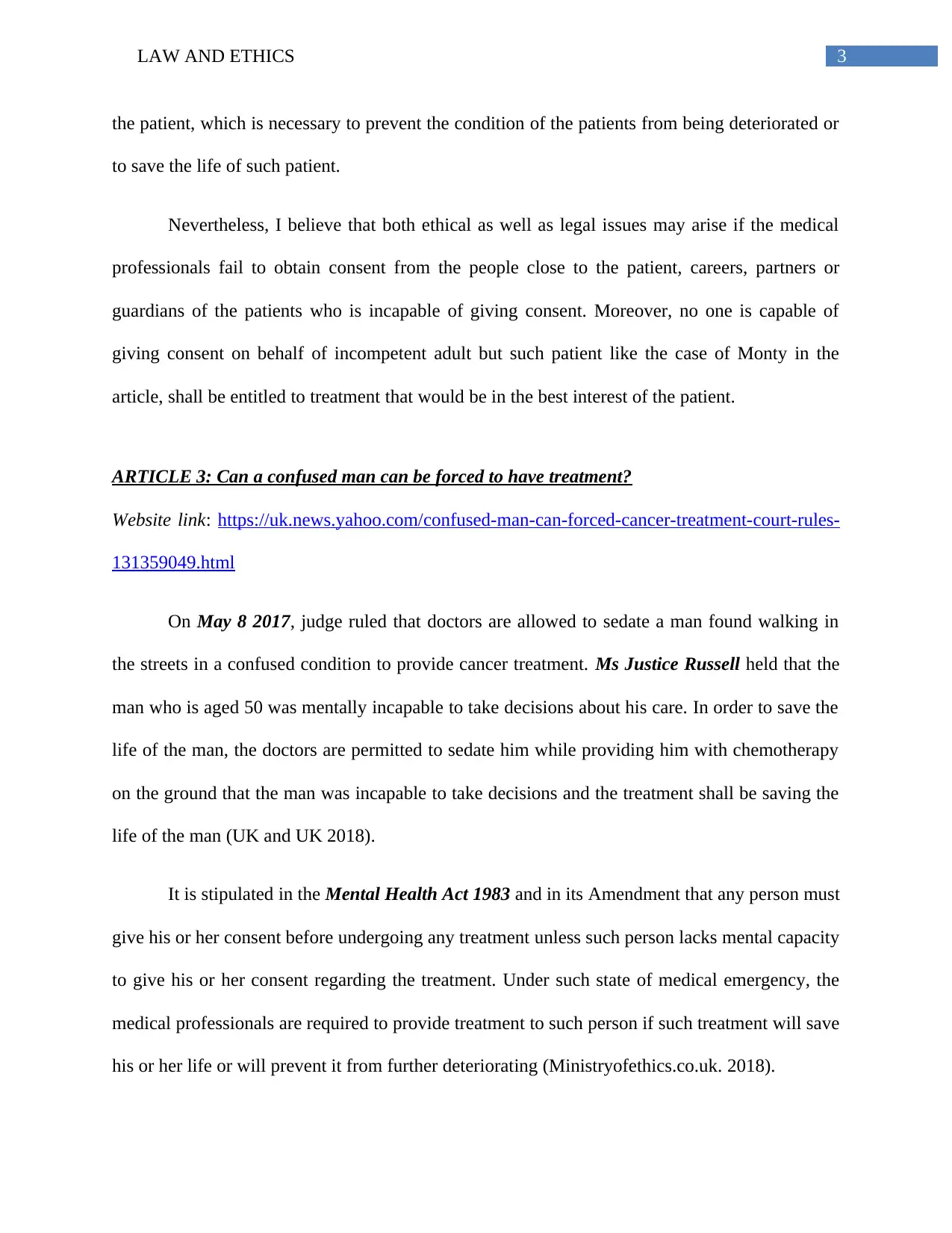
3LAW AND ETHICS
the patient, which is necessary to prevent the condition of the patients from being deteriorated or
to save the life of such patient.
Nevertheless, I believe that both ethical as well as legal issues may arise if the medical
professionals fail to obtain consent from the people close to the patient, careers, partners or
guardians of the patients who is incapable of giving consent. Moreover, no one is capable of
giving consent on behalf of incompetent adult but such patient like the case of Monty in the
article, shall be entitled to treatment that would be in the best interest of the patient.
ARTICLE 3: Can a confused man can be forced to have treatment?
Website link: https://uk.news.yahoo.com/confused-man-can-forced-cancer-treatment-court-rules-
131359049.html
On May 8 2017, judge ruled that doctors are allowed to sedate a man found walking in
the streets in a confused condition to provide cancer treatment. Ms Justice Russell held that the
man who is aged 50 was mentally incapable to take decisions about his care. In order to save the
life of the man, the doctors are permitted to sedate him while providing him with chemotherapy
on the ground that the man was incapable to take decisions and the treatment shall be saving the
life of the man (UK and UK 2018).
It is stipulated in the Mental Health Act 1983 and in its Amendment that any person must
give his or her consent before undergoing any treatment unless such person lacks mental capacity
to give his or her consent regarding the treatment. Under such state of medical emergency, the
medical professionals are required to provide treatment to such person if such treatment will save
his or her life or will prevent it from further deteriorating (Ministryofethics.co.uk. 2018).
the patient, which is necessary to prevent the condition of the patients from being deteriorated or
to save the life of such patient.
Nevertheless, I believe that both ethical as well as legal issues may arise if the medical
professionals fail to obtain consent from the people close to the patient, careers, partners or
guardians of the patients who is incapable of giving consent. Moreover, no one is capable of
giving consent on behalf of incompetent adult but such patient like the case of Monty in the
article, shall be entitled to treatment that would be in the best interest of the patient.
ARTICLE 3: Can a confused man can be forced to have treatment?
Website link: https://uk.news.yahoo.com/confused-man-can-forced-cancer-treatment-court-rules-
131359049.html
On May 8 2017, judge ruled that doctors are allowed to sedate a man found walking in
the streets in a confused condition to provide cancer treatment. Ms Justice Russell held that the
man who is aged 50 was mentally incapable to take decisions about his care. In order to save the
life of the man, the doctors are permitted to sedate him while providing him with chemotherapy
on the ground that the man was incapable to take decisions and the treatment shall be saving the
life of the man (UK and UK 2018).
It is stipulated in the Mental Health Act 1983 and in its Amendment that any person must
give his or her consent before undergoing any treatment unless such person lacks mental capacity
to give his or her consent regarding the treatment. Under such state of medical emergency, the
medical professionals are required to provide treatment to such person if such treatment will save
his or her life or will prevent it from further deteriorating (Ministryofethics.co.uk. 2018).
Paraphrase This Document
Need a fresh take? Get an instant paraphrase of this document with our AI Paraphraser
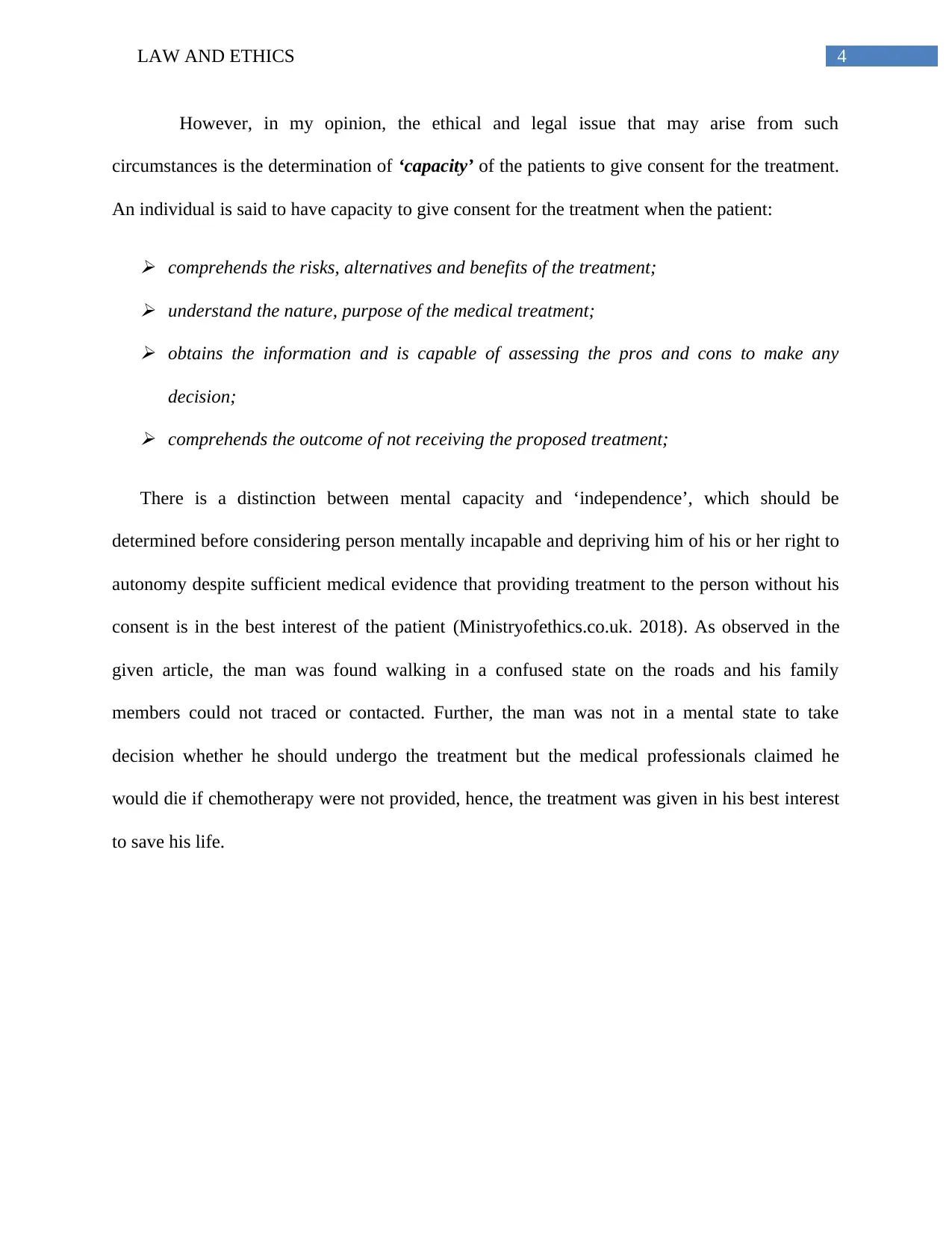
4LAW AND ETHICS
However, in my opinion, the ethical and legal issue that may arise from such
circumstances is the determination of ‘capacity’ of the patients to give consent for the treatment.
An individual is said to have capacity to give consent for the treatment when the patient:
comprehends the risks, alternatives and benefits of the treatment; understand the nature, purpose of the medical treatment; obtains the information and is capable of assessing the pros and cons to make any
decision; comprehends the outcome of not receiving the proposed treatment;
There is a distinction between mental capacity and ‘independence’, which should be
determined before considering person mentally incapable and depriving him of his or her right to
autonomy despite sufficient medical evidence that providing treatment to the person without his
consent is in the best interest of the patient (Ministryofethics.co.uk. 2018). As observed in the
given article, the man was found walking in a confused state on the roads and his family
members could not traced or contacted. Further, the man was not in a mental state to take
decision whether he should undergo the treatment but the medical professionals claimed he
would die if chemotherapy were not provided, hence, the treatment was given in his best interest
to save his life.
However, in my opinion, the ethical and legal issue that may arise from such
circumstances is the determination of ‘capacity’ of the patients to give consent for the treatment.
An individual is said to have capacity to give consent for the treatment when the patient:
comprehends the risks, alternatives and benefits of the treatment; understand the nature, purpose of the medical treatment; obtains the information and is capable of assessing the pros and cons to make any
decision; comprehends the outcome of not receiving the proposed treatment;
There is a distinction between mental capacity and ‘independence’, which should be
determined before considering person mentally incapable and depriving him of his or her right to
autonomy despite sufficient medical evidence that providing treatment to the person without his
consent is in the best interest of the patient (Ministryofethics.co.uk. 2018). As observed in the
given article, the man was found walking in a confused state on the roads and his family
members could not traced or contacted. Further, the man was not in a mental state to take
decision whether he should undergo the treatment but the medical professionals claimed he
would die if chemotherapy were not provided, hence, the treatment was given in his best interest
to save his life.
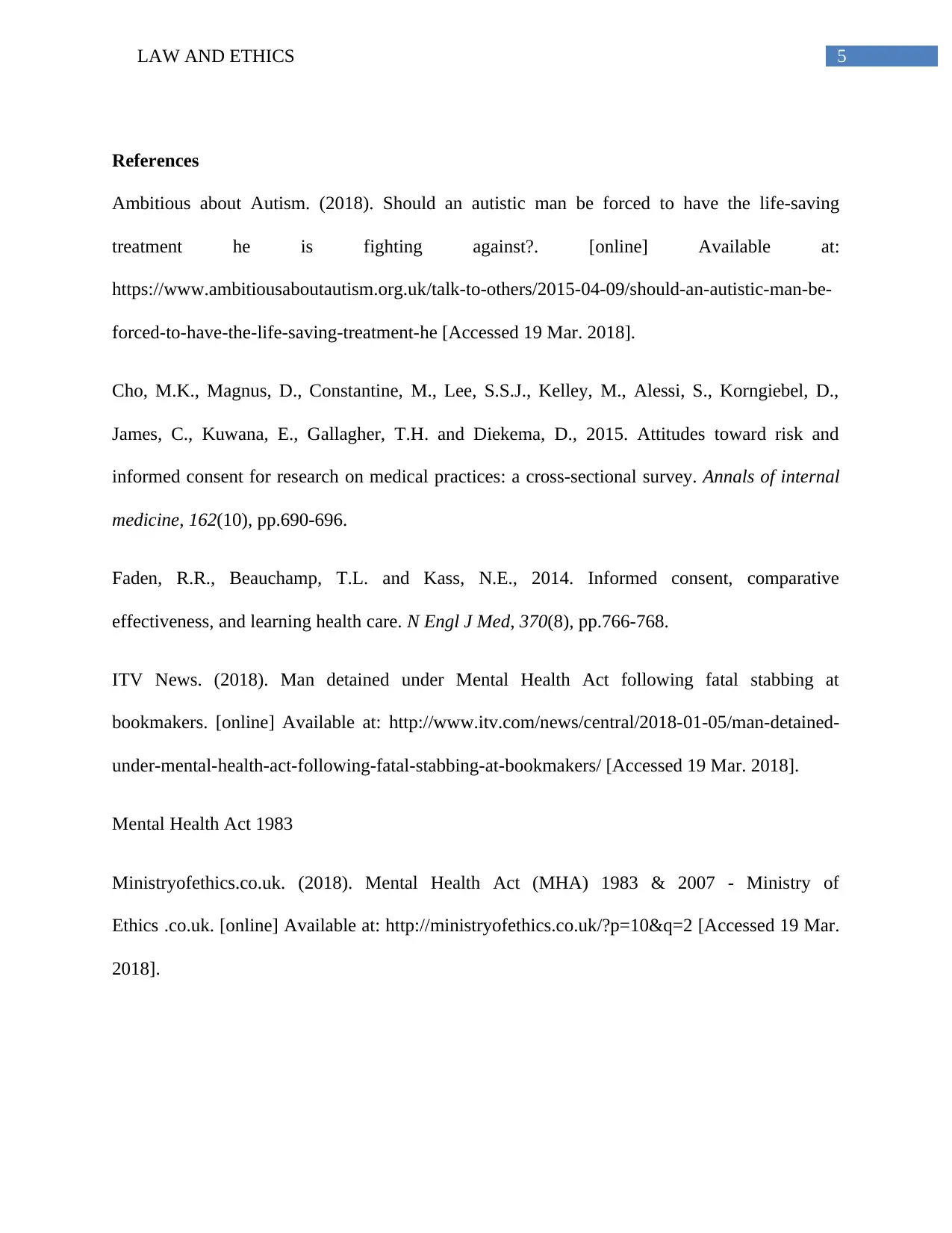
5LAW AND ETHICS
References
Ambitious about Autism. (2018). Should an autistic man be forced to have the life-saving
treatment he is fighting against?. [online] Available at:
https://www.ambitiousaboutautism.org.uk/talk-to-others/2015-04-09/should-an-autistic-man-be-
forced-to-have-the-life-saving-treatment-he [Accessed 19 Mar. 2018].
Cho, M.K., Magnus, D., Constantine, M., Lee, S.S.J., Kelley, M., Alessi, S., Korngiebel, D.,
James, C., Kuwana, E., Gallagher, T.H. and Diekema, D., 2015. Attitudes toward risk and
informed consent for research on medical practices: a cross-sectional survey. Annals of internal
medicine, 162(10), pp.690-696.
Faden, R.R., Beauchamp, T.L. and Kass, N.E., 2014. Informed consent, comparative
effectiveness, and learning health care. N Engl J Med, 370(8), pp.766-768.
ITV News. (2018). Man detained under Mental Health Act following fatal stabbing at
bookmakers. [online] Available at: http://www.itv.com/news/central/2018-01-05/man-detained-
under-mental-health-act-following-fatal-stabbing-at-bookmakers/ [Accessed 19 Mar. 2018].
Mental Health Act 1983
Ministryofethics.co.uk. (2018). Mental Health Act (MHA) 1983 & 2007 - Ministry of
Ethics .co.uk. [online] Available at: http://ministryofethics.co.uk/?p=10&q=2 [Accessed 19 Mar.
2018].
References
Ambitious about Autism. (2018). Should an autistic man be forced to have the life-saving
treatment he is fighting against?. [online] Available at:
https://www.ambitiousaboutautism.org.uk/talk-to-others/2015-04-09/should-an-autistic-man-be-
forced-to-have-the-life-saving-treatment-he [Accessed 19 Mar. 2018].
Cho, M.K., Magnus, D., Constantine, M., Lee, S.S.J., Kelley, M., Alessi, S., Korngiebel, D.,
James, C., Kuwana, E., Gallagher, T.H. and Diekema, D., 2015. Attitudes toward risk and
informed consent for research on medical practices: a cross-sectional survey. Annals of internal
medicine, 162(10), pp.690-696.
Faden, R.R., Beauchamp, T.L. and Kass, N.E., 2014. Informed consent, comparative
effectiveness, and learning health care. N Engl J Med, 370(8), pp.766-768.
ITV News. (2018). Man detained under Mental Health Act following fatal stabbing at
bookmakers. [online] Available at: http://www.itv.com/news/central/2018-01-05/man-detained-
under-mental-health-act-following-fatal-stabbing-at-bookmakers/ [Accessed 19 Mar. 2018].
Mental Health Act 1983
Ministryofethics.co.uk. (2018). Mental Health Act (MHA) 1983 & 2007 - Ministry of
Ethics .co.uk. [online] Available at: http://ministryofethics.co.uk/?p=10&q=2 [Accessed 19 Mar.
2018].
⊘ This is a preview!⊘
Do you want full access?
Subscribe today to unlock all pages.

Trusted by 1+ million students worldwide
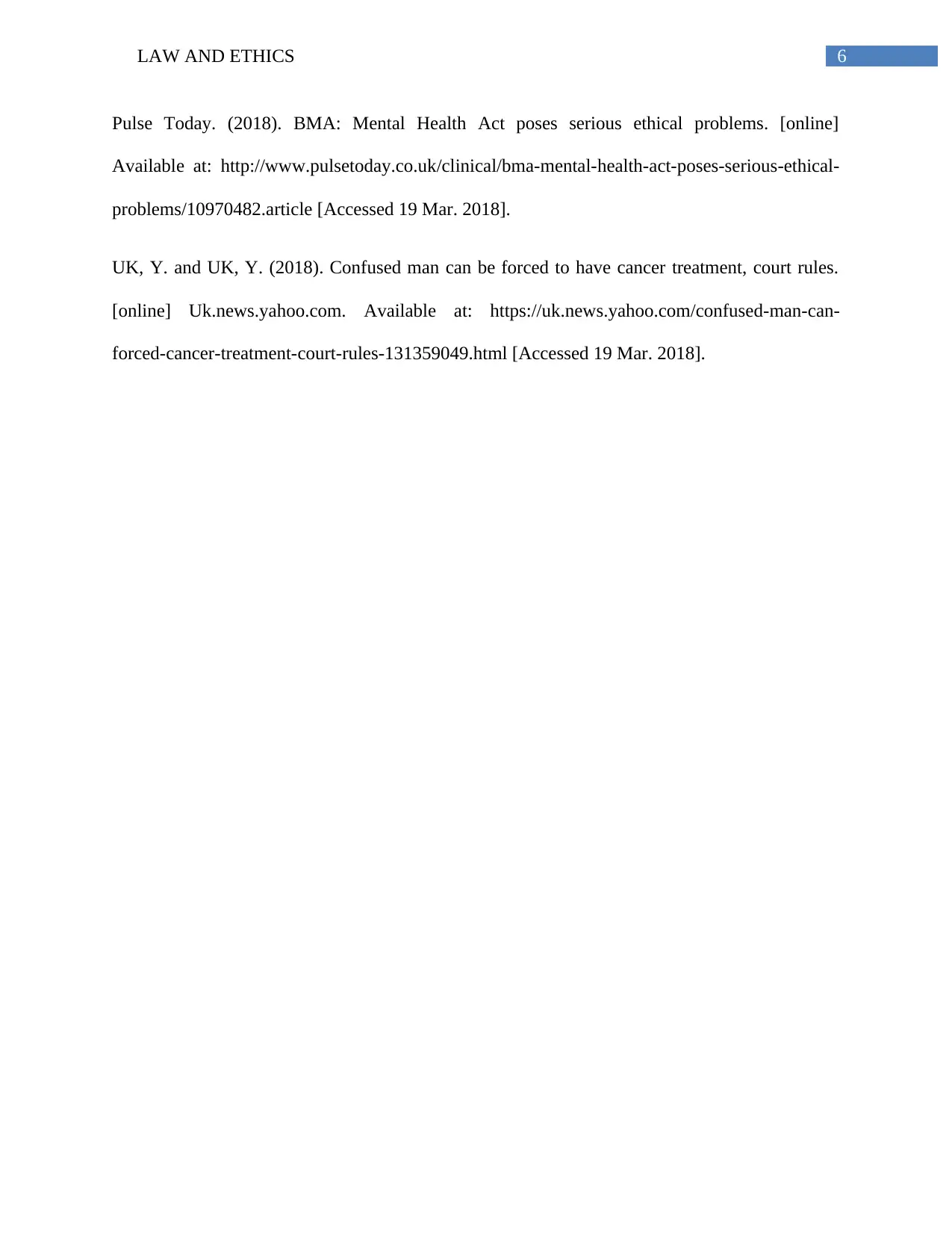
6LAW AND ETHICS
Pulse Today. (2018). BMA: Mental Health Act poses serious ethical problems. [online]
Available at: http://www.pulsetoday.co.uk/clinical/bma-mental-health-act-poses-serious-ethical-
problems/10970482.article [Accessed 19 Mar. 2018].
UK, Y. and UK, Y. (2018). Confused man can be forced to have cancer treatment, court rules.
[online] Uk.news.yahoo.com. Available at: https://uk.news.yahoo.com/confused-man-can-
forced-cancer-treatment-court-rules-131359049.html [Accessed 19 Mar. 2018].
Pulse Today. (2018). BMA: Mental Health Act poses serious ethical problems. [online]
Available at: http://www.pulsetoday.co.uk/clinical/bma-mental-health-act-poses-serious-ethical-
problems/10970482.article [Accessed 19 Mar. 2018].
UK, Y. and UK, Y. (2018). Confused man can be forced to have cancer treatment, court rules.
[online] Uk.news.yahoo.com. Available at: https://uk.news.yahoo.com/confused-man-can-
forced-cancer-treatment-court-rules-131359049.html [Accessed 19 Mar. 2018].
1 out of 7
Your All-in-One AI-Powered Toolkit for Academic Success.
+13062052269
info@desklib.com
Available 24*7 on WhatsApp / Email
![[object Object]](/_next/static/media/star-bottom.7253800d.svg)
Unlock your academic potential
Copyright © 2020–2026 A2Z Services. All Rights Reserved. Developed and managed by ZUCOL.
